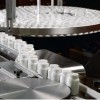
Track: (101) Smart [Bits and Atoms] Health Technologies and their Social Worlds
31st August – 3rd September 2016, Barcelona, Spain
Co-convenors: Piera Morlacchi and Gill Haddow
STS (4S/EASST) 2016 Conference ‘Science and Technology by other means: Exploring Collectives, Spaces and Futures’
Deadline and submission details: Please submit an abstract of up to 250 words by 21st February 2016 to Track 101 using the conference website.
The aim of this track is to stimulate critical conversation about the social worlds of smart health technologies that are currently transforming health and care by creating new configurations of, for example, bodies, data and devices.
In Science and Technology Studies there is a long tradition of critically examining health technologies at the interfaces of bodies, machines, animals, computers and the dynamics of their social worlds. The hybridity and integration of bodies with machines (e.g. implantable heart devices and prosthetics), animal parts (e.g. xenotransplants and tissues) and computers (e.g. haptic devices and neural implants) are now arguably part of the everyday experience for many of us. The convergences in info-, bio- and nano-technologies however are creating more complex configurations of bodies, data and devices and this complexity deserves examination. Hybrid ‘bits and atoms’ are getting more permanently integrated into the body (e.g. electronic skin, ingestible digital pills, human implantable microchip, rehab systems based on sensors and algorithms for stroke and diabetic patients, wireless and connected pacemakers and ICD).
Recently, health apps, wearables and their digital assemblages have attracted our attention. What has so far received less discussion are how new and old devices are becoming smarter as they can sense and transmit data but also autonomously act within our bodies. Our implants and prosthetics can enhance our bodies but are susceptive to attack as in the case of biohacking. Moving beyond the repair and replacement of the human body recent developments such as biofabrication mean that more tissues and organs can be made from an individual’s own cells. These health technologies create different experiences and consequences for the users, make possible new organizational modes for the producers, and more generally they could transform the current political economy of health and care. The social, ethical, legal, political and cultural dimensions and implications of these new hybrid configurations of bodies, data and devices deserve our immediate attention. The social worlds of smart health technologies and devices beckon.
This track welcomes submissions that critically examine smart health technologies and the dynamics of their social worlds, with a preference for contributions with a focus on hybrid and more permanently integrated configurations of bodies, data and devices, and /or new forms of assemblages and spaces of production and use.

